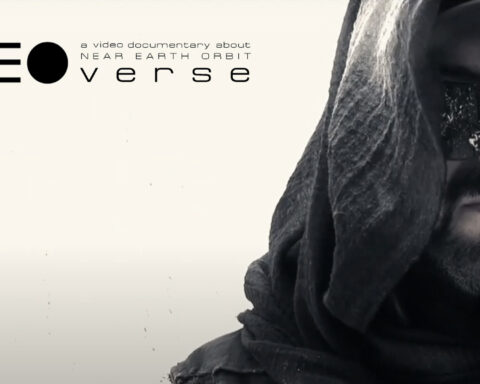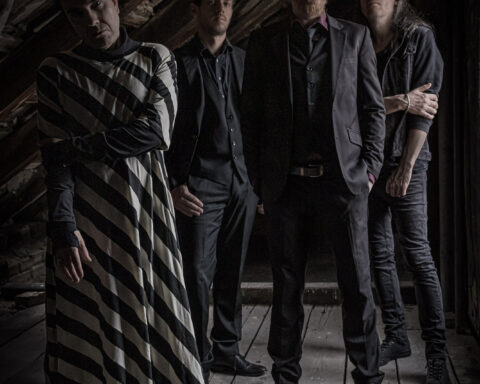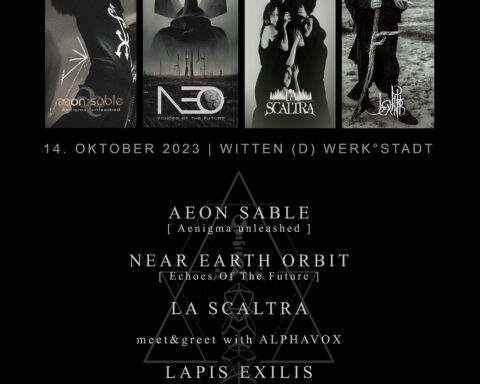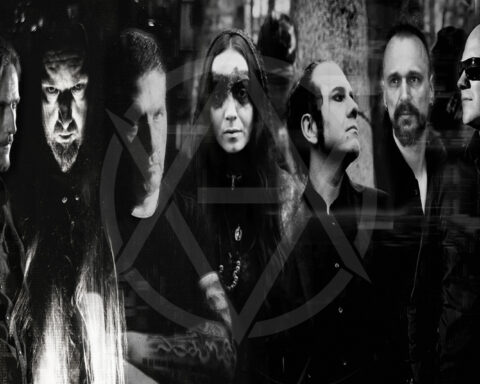Emerged from the ashes of the legendary Garden Of Delight – and the similarity ends here – Merciful Nuns has evolved from leading the XXI century’s resurgence of Goth to becoming a unique genre in itself. In 4 intense years – both in studio and live – the Germans have retrieved what made early sinister music vibrate in all their natural force at a time when the blurred line between Post-Punk and Goth Rock still enabled a healthy mutual transfer.
Nevertheless, their approach to that essential spirit is much polished and modern. If one thing is clear it’s that this band blazes its own trail in dark music: „I consider myself more like the architect of my very own post-Goth universe“ – mastermind Artaud Seth says – „Back then we tried to escape the multicoloured, loud and superficial ‚fun-society‘. And yet, however ironic and curious this may seem, it forms the very foundation of the modern scene. Then again, the modern Greens are selling weapons to the Saudis too; perhaps it is inevitable that a group will eventually take that which it hates the most into a loving embrace“ – he adds, analysing the evolution of the scene since its inception.
Certainly, Artaud, Jawa and Jón Tmoh revive that pitch-black splendour by means of musical designs that intentionally devoid of excessive decoration to better convey the depth of the message behind. More than anything else, they aim to stimulate the listener’s imagination. For that purpose, each element is strategically placed in the mosaic so that the concept is accurately embodied. Assumed by daring, high-level musicians, the challenge succeeds and, thereby, we experience as plausible what is actually illusory. In fact, force of attraction and power to inspire are hallmarks of their music. Merciful Nuns galvanizes us to scan whether inwardly or beyond in search for clues upon which to base our own views on the ages-old human questions, either taking us on wondrous exoplanetary journeys through eerily serene sound realms or on ulterior odysseys across weird dimensions where mythology, remoteness and occult meet, or yet by sending us to raptures with anthemic rushes of gloomy rock.
„I am driven by the unifying factor behind ALL forms of mythology, religions or any other forms of faith and devotion, both terrestrial and beyond. Why does the human mind believe in stories incepted by human minds so much that they could give rise to religions? Where are the parallels? Where are the common origins? Where is the core of truth!“ – Artaud explains – „I may not possess the knowledge itself, but insightful imagination to find answers I have in abundance“ – he continues – „What if there were no God but instead we ourselves are the gods? Or where do we come from? Where does our development take us? Why do we use at best just 2/3 of our mental capacity? Is humanity all but one major experiment in the architect’s laboratory? What is space? What is time? What is infinity? And what of the finiteness of our existence? These kind of questions are the driving force for me and also my inspiration…“ – and he concludes: „I just want to know where we come from and where we are heading, plain and simple as that.“
On the basis of all the above, the self-professed „Occvlt Post Goth“ seems a totally apt label to define the Merciful Nuns‘ sound.
No less significant is the visual shape of the concept. As with music, it’s reduced to the necessary minimum so that it emphatically delivers on its message. While a rousing fusion of eras and cultures is evoked and thus those archaic forms turn into a nexus linking past, present and future. Precisely, this coherence among graphics, sounds, lyrics, videos and stage imagery lends the band a totemic identity and further enhances its power of suggestion. „The graphic representation of my conceptual and contextual ideas is rather important to me. Every element ought to complement, even supplement each other as an integral unit. This particular style has developed into a secondary, explanatory level to my art work“ – Artaud.
No other band has covered so much ground within the Goth realm in such a short time. Merciful Nuns is an insatiable beast, as its prolific – yet compelling – output has demonstrated since 2010. No less than 7 albums, 6 EPs and 2 live recordings – apart from this compilation – form their rich musical legacy. „… I prefer creativity! I just love good sinister music. Since no one else seems capable to deliver such albums in regular intervals I might as well do it myself. I am not one for idleness, so what choice do I have?“ – Artaud, regarding to his creature’s high fertility. However, records don’t sell themselves and thousands of worldwide devotees can’t be wrong. They’ve cohesively created an intricate, cryptically dark universe which exerts great attraction on discerning listeners. They’re equally proficient in handling both atmospheres and drives what enables them to write peerless anthems – but always giving priority to contextual requirements. Usually synthed into the backdrop, there’s something ominous that matches our pulse for a dizzying acceleration. Typically, they weave their songs into the neurological, deep bass throbbing of Jawa. It locks solid with the unfussy drum-beats, setting together a primordial, chest-thumping pace. Nuancing the chilly ambiances is guitarist Jón Tmoh. Sometimes as co-driver, churning out jagged riffs and mournful wails with immemorial traces; other times, keeping us entranced through shimmering, soulful harmonies. Hovering over all is the undisputable drawing power of a singer who is able to bring us closer the intangible with great authenticity. Artaud’s distinctive, low-pitched voice resounds within the structures with a cathedral-sized echo. He skilfully shifts from soaring sorrow to raging despair, conveying a flood of brooding emotions. In addition, his clever mixing and refined, present-day production further strengthen the sinergy among all the elements. To put it simply: impeccable obscure music that bears the stamp of time.
Merciful Nuns was first pressed to our consciousness at the beginning of 2010. Previously, the rumours about a new incarnation of Seth aroused great expectation. They become reality in March when the band’s debut full-length album saw the light. „Lib. I“ was also the very first output by Artaud’s record label, Solar Lodge, so that he controlled the entire process from the creative act to production and distribution. At that time, the dark scene didn’t look very receptive to genuine Goth Rock and, although sharing mastermind, this project and the formers rather differed in both philosophic and musical terms. According to Seth: „… it originates in a whim of mine to create something which would return me personally to a time when I discovered my passion for music…“ – and he continues – „… Golden Dawn, Freemasonry, Rosicrucianism were further subjects which seeped into ‚Lib. 1’…“. Unexpectedly, its 1st edition was sold out a week before the date of release, entering straight to number 1 in the InfraROT chart. Given that success their live plans began to take shape. Barely 2 months later, a 4-track EP called „Body of Light“ followed. With it, their anthemic skills started to excel in tracks like the homonymous or „Morphine Queen“.
2011 was crucial and held some essential keys to understand what was to happen later. Already in January their 2nd long-playing „Hypogeum II“ was released. It marked a major step forward for Merciful Nuns. Terms like concept, atmosphere, cinematic or journey reached their strongest expression in this album, definitely crystallizing in the band’s trademark. „Returning from the core of the Underworld“ and towards „the forgotten fields of the Megalithic culture“, „Hypogeum II“ induces a primordial, truly dark catharsis space for the listener to reflect on the „highly-advanced groups of men that virtually kick-started the world“. Their 2nd 4-track EP came next in April. „Ancient Astronauts“ (its title is self-explanatory) included one of their highly-acclaimed classics: „The Eternal“.
4 months later, their 1st live recording was released. „Infinite Visions“ comprises of a DVD, featuring the full concert at Berlin’s SO36 on April, and a CD with 3 tracks defined as an exclusive ritual soundtrack for their darkest live moments. In September, the 1st Nunhood – an amalgamation of like-minded seekers based around Merciful Nuns – meeting took place at Berlin’s mythical K17. An audio testimony of the event was released under the name „The Gathering LIVE“ in November.
One month later, the band’s 3rd album „Xibalba III“ came out. It further consolidated Merciful Nuns as the Goth Rock referent of its time. In contrast with the preceeding, we were abruptly descended into the Mayan infraworld Xibalba – roughly translated, „place of fear“ – what logically involved a sonic shift. The overall vibe is apocalyptical and guitars are rather more prominent, ranging from deafening riffs to anxiety-inducing crescendos. Again, there is an old belief arising from the mysterious chants: „We have been visited and called this visitor: God“ – Artaud.
Their 3rd 4-track EP followed in February 2012. „Genesis Revealed“ perfectly balance mood with pace. It includes hymns such as the forceful title mid-tempo, the delightfully windswept „Enlightenment“ or the mournfully slowed-down „All Days are Black“. By that moment, they yet owned by right a cult band status. It was not until November that their 4th long-playing was published. „Goetia IV“ cinematicly take us far away in time and space to discover the „keys to the gate of divine light“. Drawn in that interpretation of Kybalion and virtually located in the Old Testament era’s Middle-East, these songs reveal a steady technical improvement. There are progressive, dreamy gems like „Love Is Will Purified“ and solid Goth numbers such as „The Nazarene“ or „Valley Of The Kings“. Its conjoined sibling „Goetia V“ was born in February of 2013. In a sense, „Goetia IV“ is an initiatic rite for the more elevated offering of „Goetia V“. With the exception of the paradigmatic „The Maelstrom“, it was incepted for contemplative purposes and, therefore, Artaud’s vocal and filmic trades are the main pivot. The 3-stage intuitive, forbidding voyage comprised of „Dark Water“, „The Lake“ and „Wailing Wall“, or the 9-minute ghostly, elegiac symphony „Resting Under Deep Dark Water“, are some of the standouts here. „…It’s a sentimental journey into the heart of all mourning…“.
In November, the Germans released their celebrated 6th full-length album. Originally packed with their 4th 4-track EP „Supernovae“, it meant a new take on their thematic and sound. So far, we looked at our inner self to turn insights into trans-mundane but earthy experiences, whilst „Exosphere VI“ brings us closer to worlds beyond where the remnants of ancient civilizations can be easily felt. Thus, a flawless sidereal score is provided first so that each listener arrives at his/her own conclusions – „Why are WE? Where are WE? And where will go WE?“. This record accomodates evergreens of any kind, from potent gloomy rockers like „Exosphere“ or „Supernovae“ to ambitious, gradual thrillers such as „Ultraviolet“ or „Black Body“. While the best is kept till last with the bewitcher „The Passing Bell“: 11 minutes of wholly-owned, artful gloom at its prime. „… / black, empty / infinite deep / then something!“. Taking the previous „one step further beyond the Alphashere“, their 5th EP „Exoplanet“ was released in 2014. Accompanying the title 4-track CD, there is a 7″ Vinyl called „Earth“ whose analog sound accurately reflects the EP’s wintry, grim contextual half. A sequential narrative could be discerned. First, „a shimmering aural wall ever so slowly takes shape and builds in intensity“ from a freezing nothingness – corresponding with „Gamma Ray“, upon the A-side. Second, that stellar burst leds to a „blurred exile“ („A Day That Fades“, on the opposite). Finally, an awe-inspiring crossing throughout the universe („Exoplanet“ CD itself). It’s a magnificent, freely interpretable soundtrack that might well be a reminder „of that which we have forgotten“.
2014 witnessed two more first-class releases. „Meteora VII“, their 7th long-playing, and „33 Grade“, a 4-track EP strictly limited to 33 copies conceived as a special gift „for the Inner Circle and a chosen few“ – Artaud says – „For me the 33rd Degree represents a metaphor for perfection, alluding to Freemasonry as something that can be deemed god-like“. Fictitiously placed „at the event horizon between this world and the beyond“, it offers a fascinating voyage across ancient Greek mithology (Elektra, Triton, Hades, Cyclops, the Eleusinian Mysteries, the Morphic Fields) and towards ‚transformation‘. While the main impact is the faithful sonic embodiment of that far-off imagery. Impelled by the music we raise our eyes skyward and beyond. Although we traverse a more terrestrial sphere, the pair formed by „A Place Beyond“ – both latest album’s nexus – and „A Day That Fades II“ offers a zero-gravity flight through a pitch-black infinity, filled with a primitive sacredness. Despite, or because of, their apparent simplicity, both have an overwhelming strength. More anthemic, yet equally stirring, there are timeless songs like „Karma Inn“ or „Speed Of Light“, while „Eulusian Ground“ and „Zero G“ teach us a lesson about epic post-Goth grooves. „Phantom Wall“ frantically slithers in step with a turbulent, old-school drive that fits the otherworldly lyrical whirlwind.
“There is a distinct sense of purpose for the engagement in this subject at this moment in time. The questions are compacting slowly but surely into a revelation. For me, THELEMA VIII marks out a milestone of comprehension.” Artaud
In the beginning of 2016 visitors to the official MERCIFUL NUNS website are greeted by a lone Astronaut at the entrance of a gigantic building, a pyramid or perhaps a sepulchre. A strong image that immediately triggers a chain of associations, similar to those evoked within by “Thelema VIII” – the new album from Artaud Seth, Jón and Jawa – the MERCIFUL NUNS. Thelema is of Greek origin and denotes the Will – the album’s subject matter, or more specifically: the awakening of individual will within every single one of us. Like a golden thread running through the revolutionary projection to enforce one’s own will, oppose and reject oppression; determine one’s own path according to one’s own ideals and without compromise. Why revolutionary? Because modern society pursues coordination and synchronisation rather than individuality. A pre-released trailer to “Thelema VIII” posted on Facebook features two citations: “Do what thou wilt shall be the only law” – addressing individual freedom and “Every man and every woman is a star” – denoting gender equality. These tenets for gregariousness were transferred to a distant exoplanet in order to bear fruit in a dystopic society. Evidently both citations originate from Aleister Crowley, a renowned and infamous occultist who achieved dubious fame at the beginning of the last century. This exoplanetary society did, however, not live in accordance with Crowleyan principles but rather those of François Rabelais who, at the beginning of the 16th century endeavoured to establish a new social structure – the Abbey of Thelema. He is indeed worshipped by the population as the creator. “Thelema VIII” pounds my ear-drums with an implosion of driven impellent Occult-Rock. Rarely has an album succeeded in drawing the listener so convincingly and quickly under its spell. Instantly pinpointed and excessive songs, wildly scrimmaging and menacingly dark penetrate the auditory canals. In the NUNS’ typical style we find the synapsis exceeding the process of mere listening by posting a fundamental question of meaning in its literary context. On this occasion we find the inquisitive Socrates on his journey into the abyss of a dystopic society living in accord with Thelemitic principles on a distant exoplanet. Still got questions? Join THELEMA VIII!
The Merciful Nuns, brainchild of the enigmatic Artaud Seth, return with their ninth instalment of an epic journey through the pansophic traditions of sacred wisdom and knowledge: “A-U-M IX” continues to deliver a profound lyrical context against a backdrop of mesmerising soundscapes and carefully orchestrated containment of driven energy. This time the journey takes us into the realms of Eastern philosophy, a tour-de-force in the manner established fans of the band have grown accustomed to and will no doubt find their anticipation suitably serviced with “A-U-M IX”.
With every album, the NUNS’ raise the bar further still and this latest opus is no exception. What sets them apart from their contemporaries is, amongst other things, Artaud’s refusal to pamper to convention. His productive output is already legendary, seemingly driven by an insatiable desire to unravel the ancient mysteries, all the while pushing perceived boundaries beyond genre defining aspects. Where most bands are contended with the release of a new album every other year, the NUNS’ release new material at an astonishing rate exceeding one album per year easily. Even more remarkable when we consider another integral aspect which sets them apart from others: Every album delivers a condensed account comprising personal experiences and revelations received and perceived on location(!) – how many artists can claim to immerse themselves in their work to such an extend I wonder? Artaud is not satisfied with reading up on a subject, he prefers to experience and absorb it, a level of dedication that seems to fire his inspiration and defines his work ethic. Hence the finished album invariably contains much more than ‘just music’, transcending the mere production of an album in order to satisfy commercial expectations with all the associated artistic constraints. Artaud freed himself from said constraints with the inception of the NUNS and has steered his own course rather successfully ever since, culminating to date in “A-U-M IX”. The album will appeal to the genuine seeker as well as casual listeners, the quality of the songs and their production is a given when we talk about the MERCIFUL NUNS, Artaud’s voice in all its facets revealing the scope of its power: soothing, teasing, imploring and chastising as the situations demands. Jawa’s bass work once again expertly arranged to deliver a powerful yet measured approach in setting the tempo, providing a solid and sound foundation for Jòn’s effective and intricate contribution on guitar – ever more assuming a unique and identifiable signature sound. Vocals, bass and guitars are arranged in perfect harmony and in support of each other; one never gets the impression of listening to three individuals working together but rather a coordinated trinity at work.
A-U-M – transports the listener into the midst of a shamanistic ritual of the Far Eastern tradition. Close your eyes and embrace the steady drumbeat’s vibration, allow the soundscapes to envelop your senses to fully appreciate the power of A-U-M. Like the master of ceremonies that he is, Artaud delivers the instructions on the alignment for body, mind and spirit in his customary and concise manner, supported by restrained yet powerful bass and guitar lines in balanced harmony. Beyond Nirvana changes the atmosphere into a more driven – in your face – pace, introducing us to the salutations to Shiva the transformer, essentially commencing our journey towards alignment in a most effective manner; one feels compelled to move with the beat into an almost trance like state. Eternal Decay offers an uplifting transition. Undoubtedly the song which will appeal to the broadest spectrum of listeners in quite a contradictory manner whereby Artaud magnificently elaborates on the most difficult and despairing aspects of the transformation process in a rather uplifting melodic setting, almost as if reinforcing his defiance against the prevailing conditions in certain anticipation of ultimate attainment.
Next we embark on a fast paced journey into a world in service and supplication to the Fire God Agni with Cremation, a powerful lament, interspersed with brief periods of respite before we are drawn back into the fast flowing currents and subsequently encounter the sleeping serpent of primal energy in Kundalini Express: slowing the tempo and restoring a more profound ambience, Jawa’s bass steadily supports the flow of Jòn’s guitar riffs in enhancement of the intended awakening of primal energy, all the while Artaud reminding us of the necessity to attain a state of meditative consciousness; a song that flows hauntingly like the constant current of a trance inducing dynamic. In Disclosure we encounter Kali, goddess of time, creation and destruction and the demon Mara who personifies the forces antagonistic to enlightenment. A thought provoking song enticing the listener to inner contemplation and realisation. Accordingly, the sound exerts an almost subliminal effect in the background with Artaud’s voice grabbing the listener’s attention. A very astutely composed piece of music laced with a hidden dynamic that resonates beyond the perceptible.
Lightwaves reduces the tempo further still; Artaud’s voice goes into recital mode supported by an atmospheric soundscape in near ecclesiastical fashion – drawing the listener ever deeper into the transcendental experience. A homage to Mara in his association with death & rebirth, here we seem to reach the point of separation and transition into a higher form of consciousness. With the Lost Chord of the Sun we reach awakening in an enlightened state of existence. A steady hum introduces the song as Jawa and Jòn set the rhythm for Artaud’s incantation of the A-U-M symbol at its most assertive and powerful. The sound drops off after 5.35 minutes, followed by a period of profound silence, the purpose of which ought to be clear to any serious student of the mystic arts, before concluding after 9.40mins of running time – as it all began…. Closing a circle with neither beginning or end!
In conclusion: If you are looking for broken hearts, world misery, self pity or any other ‘mundane’ happy-go-lucky singalong concepts to tab your feet to then this album won’t be for you. Equally, if you expect wisdom and revelations spoon-fed from a platter you won’t find it here either.
If, however, you are prepared to listen, contemplate and allow yourself to be carried along a journey of profound mystery or if you just want to indulge in awesome soundscapes and solid audio entertainment of quality songs throughout where lyrics and sound align in perfect harmony – then look no further, “A-U-M IX” delivers in abundance.
A remarkably well conceived and executed production, probably MERCIFUL NUNS’s best album yet on multiple levels.
Billyphobia – November 2017
Discography (album)
Liber I (2010)
Hypogeum II (2011)
Xibalba III (2011)
Goetia IV (2012)
Goetia V (2013)
Exosphere VI (2013)
Meteora VII (2014)
Thelema VIII (2016)
A-U-M IX (2017)
Anomaly X (2018)






